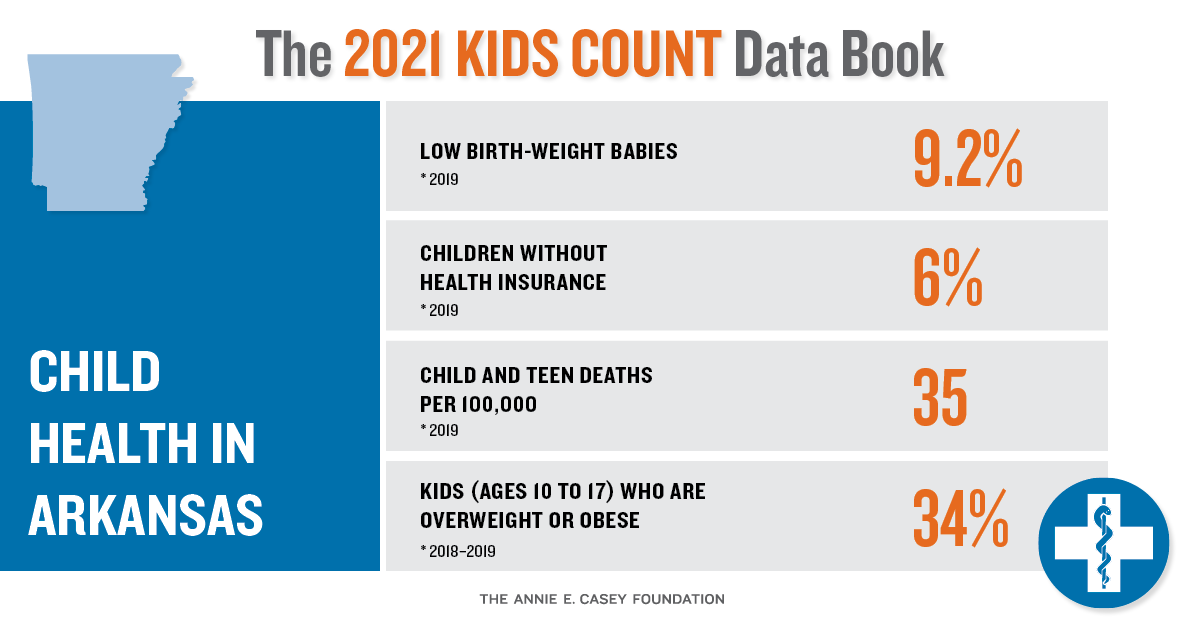
Editor’s note: The 2021 KIDS COUNT® Data Book is a 50-state report of recent household data developed by the Annie E. Casey Foundation analyzing how families have fared between the Great Recession and the COVID-19 crisis. Arkansas Advocates for Children and Families is Arkansas’s member of the national KIDS COUNT network.
This year’s KIDS COUNT® Data Book shows that we have a lot more work to do to improve children’s health in Arkansas in several key areas. Historically, Arkansas has lagged in its overall child health ranking, according to the Data Book. Last year, Arkansas ranked 40th in child health when compared to other states. This year the state child health ranking dropped to 41. A closer look at the individual indicators provides more insight into the areas where Arkansas has room to make progress.

Arkansas ranks 38th out of the 50 states for the percentage of children born with low birth weights. From 2010-2019, there has been a 5% increase for the state in this category, and the current percentage of babies born with low birth weight in the state is 9.2%. This figure is higher than the national rate, 8.3%.
Arkansas has consistently struggled with higher-than-average child and teen deaths over the past decade. According to this year’s Data Book, our death rate among children ages 1-19 in 2019 was 35 per 1,000 kids, well above the national rate of 25 per 1,000. Between 2010 and 2019, our rate increased by 3%, and our current rank on this indicator is 42nd.
Arkansas’ ranking fell from 24th in 2018 to 29th in 2019 for uninsured children, with 6% of children in the state going without health insurance. Given the challenges faced by both medical providers and patients during the pandemic, it is even more concerning that Arkansas continues to increase its number of uninsured children. From 2010-2016, there was a continuous decrease in the number of uninsured children in Arkansas, except for 2011-2012. This trend reversed in 2017 and continues to worsen with the number of uninsured children increasing again, this time from 34,000 in 2018 to 43,000 in 2019. Although we do not have data on health care coverage during the pandemic, most experts believe that the number of uninsured children in Arkansas and nationwide will be much higher for 2020, as more families lost jobs and access to employer-sponsored insurance plans.
The Data Book also includes data on the percentage of teens age 10-17 who are overweight or obese as defined by having a Body Mass Index (BMI) at or above the 85th percentile. Arkansas currently ranks 36th out of the 50 states. This is substantially higher than Arkansas’s ranking of 23rd from 2016-2017, and 24th from 2017-2018. These increases signal concern for children’s health in the state. Higher BMI in children is correlated with high blood pressure, type 2 diabetes, breathing problems, and joint problems. Childhood obesity is associated with anxiety, depression, low self-esteem, self-reported lower quality of life, and social problems bullying and stigma. With Arkansas being a rural state, many children face barriers to access to healthy foods. This is an even larger concern for those living in poverty and living within rural “food desert” communities.
The course forward should focus on obtaining and maintaining health insurance coverage and identifying any health care challenges early and treating them quickly. Ensuring that children have the care they need early can have a positive impact on their academic performance, economic stability, and health and well-being later in life.
Finally, we need more education on childhood obesity, access to healthy foods, and further efforts made to decrease food insecurity and poverty. Lack of access to healthy foods and health care is a recipe for future diseases and health conditions as a child and as an adult. Arkansas still has a long way to go to get to number one in child health and well-being.
